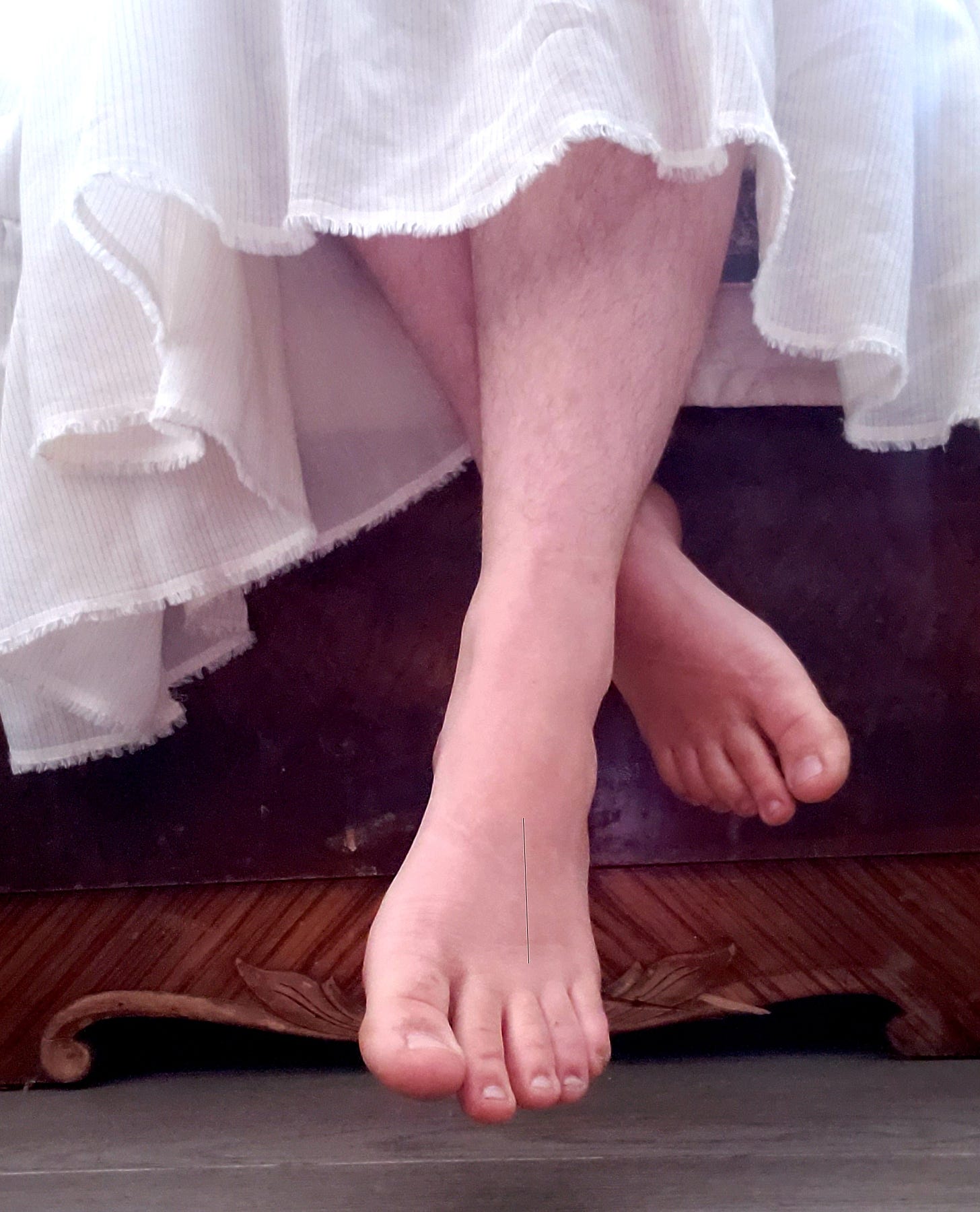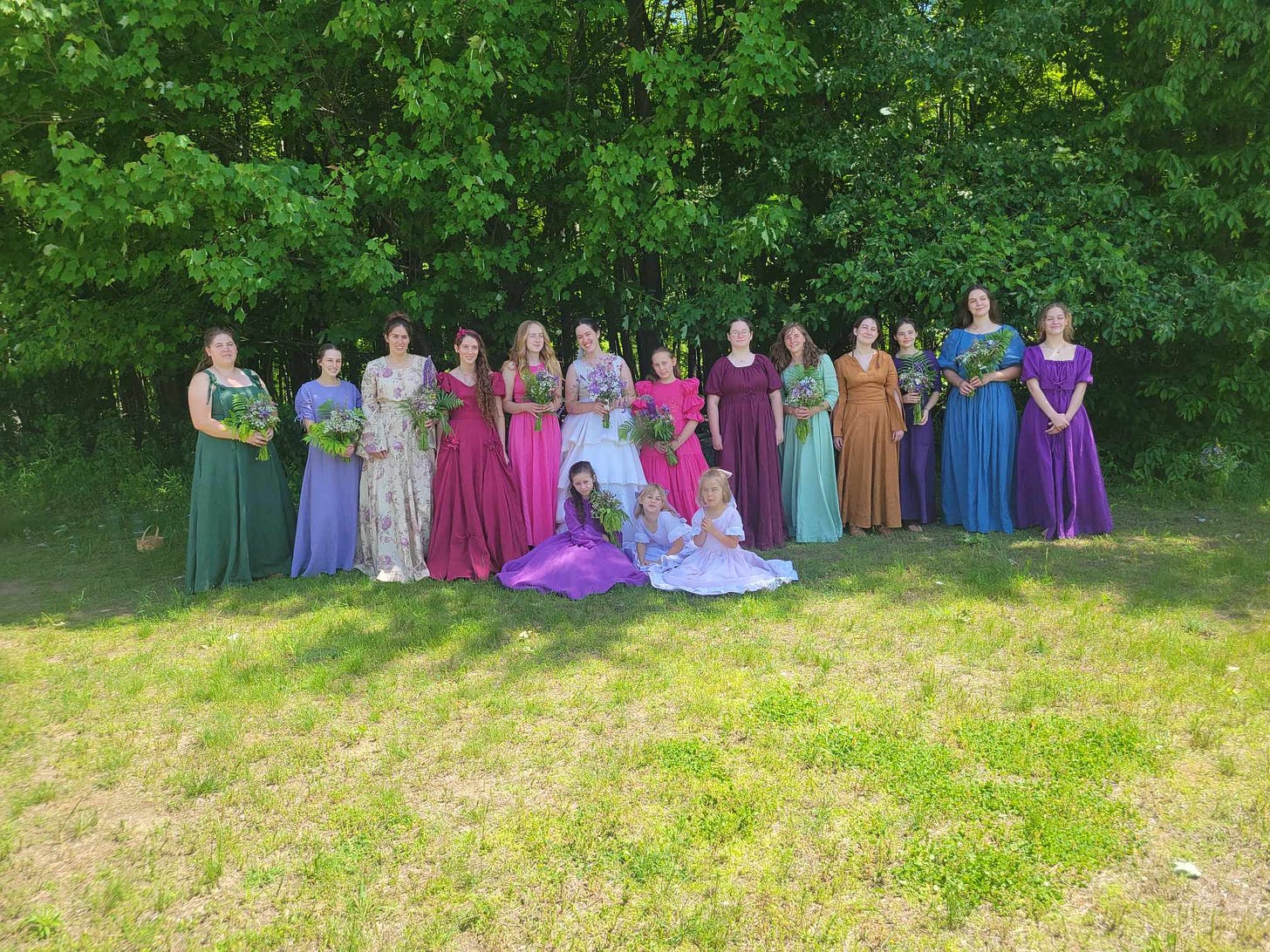Thank you to everyone who sent in questions for the manners and morals column. There are quite a few, so I’ll be answering one or three at a time about once or twice a month.
Message me if you would like to see your questions answered anonymously.
Question #1 How to Confront Immodesty
What is the proper and polite way to address a woman in church who is not adequately covered during a worship service? Should one just let her wear what she wants or should she be spoken to privately? And how should that conversation be worded? I would hope with extreme gentleness and no judgement.
live in a proper society bound by the strictures of tradition. Don’t mistake me: I find this fact unpleasant and disturbing. However, it is a corollary of the separation of church and state, and unless one is a part of an organization or church or cult that determines what one must wear, we have little authority to have a say in what our fellow sisters (or brothers) wear to church.
If you are a part of a church that has detailed guidelines that are being crossed, I advise you to stick to whatever avenue your church has laid out for addressing offenses. Preferably you have a relationship with the other woman and are able to speak to her alone. Perhaps she is not aware of how her clothes are perceived, and she might be grateful if you approach her and speak to her privately — no woman wishes to be publicly shamed about her body. If you feel you can’t do this, try to speak to a friend of hers who might be able to talk to the woman without causing offense. If her fashion choices are truly egregious you can try bringing the matter to an elder’s wife. As a last resort, you might consider approaching your pastor or priest.
It is likely that you will be told to mind your own business, and it may be pointed out to you that we do not live in the middle-east. A woman has the right to dress as she pleases. Personally, I think religions that have higher modesty standards are superior, and I wish that we lived in a culture that permitted me to speak my mind when I saw a girl entering church in leggings or short dresses. There are whole wardrobe options that I would ban completely, if I could. We were born into mainstream modernity, though, and my own opinions are deemed as just that — opinions. What I might think is decent, another might find quite modest. Who am I to tell another what they should wear?
Most likely you will not be able to find a way to speak to this woman at all, and neither will anyone else. I have seen many instances of a young girl wearing a dress that is too short, flashing her panties — or lack of panties — and when some other concerned woman informs her with something like, “Oh, dear, you must keep your knees together or lengthen your skirt!” the teenaged girl was offended, because it is, in her estimation, her right to show off what is between her legs and everyone else’s duty to look away.
Most girls do not learn from shame or lectures, and perhaps the only option you have is to exemplify beautiful, decent choices in what you wear, and in what you allow your children to wear. This is not the easy path to take, but when you choose to be graceful and decent in your own demeanor and dress, you have the opportunity to spiritually convict and inspire others to do the same without being accused of potential hypocrisy.
Question #2 Is it Unladylike to Not Wear Pantyhose or to Not Shave
I'd like to talk to you, because I want to talk about how even among one group there seem to be completely opposite perspectives on what femininity is, when it comes to personality, and I'm confused. Honestly I only have one problem with the Holiness community I grew up in— only one rule in the manual that can't be backed up by Scripture. It says that women should wear hose(tights, stockings) in public. To them this is covering the leg skin, even if the stockings are transparent, whereas to me, the only point of wearing stockings is to make your legs look sexier. So, I have only one point of deep contention with the official rules, because I think this particular one is doing the opposite of what I hope was its intent. Also, most people here seem to think that shaved legs is part of being feminine, and I'm the only one who is horrified by this (that's just unofficial practice, not rules, though.) What do you think? Should I be open about what I think, or should I try to see their perspective and integrate it myself? I have noticed that on many internet forums, women not shaving is exclusively associated with feminism. That association has definitely got me wavering on what I think about shaving. Before I read that I was always thinking God would want me natural. (Of course, probably few on those forum threads I read were serious Christians, so...) Someone has told me that the decision to add the hose rule was added in the 80s was so that we would look more different from hippie women. (Our group added stricter skirt and sleeve lengths in that time, too. Older pictures look quite different!) Also a leader has explicitly said in regards to the standard for men's hairstyles, that it would be subject to change if the current hairstyle came to mean something bad in the broader culture. So the unwritten standards are probably unwritten for that reason.
I am not as familiar with all the traditions of the Holiness Community, but I had a friend who was raised in that church when I was a girl. I, too, was brought up to dress extremely modestly, although I was discouraged from shaving until I was older. I remember thinking how it seemed the girls in the Holiness church were unable to breathe — they stood tall and tight, they wore perfect blouses and mid-length heavy skirts, and their legs were glossy and smooth. I instinctively knew they were ready to be wives — they were clean and immaculate, I felt like a Raggedy-Ann doll, floppy and cute and awkward. My modesty was natural and flowing, theirs felt like amplified sexuality. There was one time where we all were out in the barn talking about novels, and I wished they would relax or laugh or say something that showed they had a little spunk.
Finally, my friend asked me, “Why don’t you wear slips?”
I said, “Because my dress isn’t see-through. I do it when the material is thin.”
“But,” she said, “Without an extra layer men can still see the shape of your legs.”
I thought about that for a moment, stared at her very padded bra — I wasn’t allowed to wear bras like that — and replied, “It’s impossible to completely hide how we look.”
We were confused by each other. She continued to stand stiffly, and we went on to talk about other things.
In Six Invalid Reasons to Discredit Cults, I give all the reasons you shouldn’t ditch the church you were born into, even if it is considered a cult. In number five, I detail reasons why one might remain faithful to their church doctrines even if the doctrines are not backed up by scripture. Your question contains many layers, but to begin with, I would first exhort you to remain faithful to your religious roots as much as possible, no matter how man-made some of the practices of your faith might appear or feel, and to do so until you understand why they made those rules and why you would like to alter them. To choose the unknown path where you determine arbitrary rules — there must always be arbitrary rules be they self-imposed or regulated by some other authority — is the most dangerous, unwise decision any person can make. This philosophy is known as Chesterton’s Fence: don’t take down a fence unless you know why it was put there.
That being said, when the church you have determined to remain committed to has arbitrary rules that feel unnatural or evil, you do have a right to stand against them and try to create reform within your church. This is one of the most honorable, humble things you can do for your church. It requires much diligence; you do not wish to schism or usurp authority, but you desire true reform.
It is a myth to think that the female body must be modified in order to be feminine or holy. Feminists normalized shaving and wearing pantyhose — so they could wear shorter skirts and bathing suits. Only some of them have stopped shaving. However, to think that one is more of a feminist or a lesbian or a hippie because they do not do the things that feminists institutionalized is narrow-minded, and honestly born of some more sinister motive. Many churches — the Holiness church is no exception — have promoted a hybrid child-bride/ prostitute as the standard for Godly beauty, and this is abhorrent and is worthy of standing up against. I will have an eight thousand word essay coming out on this issue sometime early next year.
If you are unable to create reform or submit to such things, I advise you to not set yourself adrift. You inadvertently set yourself up to become a sort of prodigal son and other aspects of your spiritual or community life will likely depreciate. Yes, God might want your beauty to be natural, but He also wants many other things for your life. Only you can know intimately what all those things together might entail, or where it might lead you. If it leads you to the Catholic church, as it is me, let me know.
Question #3 How to Behave Around In-laws
I would love to hear your thoughts on how to behave properly with that most difficult subset of family members- one’s in-laws (specifically the mother-in-law). Perhaps it is too large and complicated of a subject!
Best regards from Minnesota
This is indeed a large and complicated question. However, I have recently gained two sister-in-laws, as well as become an in-law to my husband’s family. This topic has been at the top of my thoughts.
I do not care for many modern tropes, but perhaps the one I’ve heartily rejected the most is the idea that in-laws must always be difficult and insufferable. Unfortunately cultural tropes tend to become biases, and biases infiltrate relationships. Regardless of how one feels about their in-laws, there must be a period of time where one consciously and boldly walks on eggshells.
Because of how instantly they often turn from being strangers to family, there is great danger that in-laws might become one's enemies instead of one’s friends. This is understandable, for a new person has entered the family, and this new family claims to know a family member as intimately or well as the rest of the family — perhaps even better! No matter how you cut it, marrying into a family is one of the most audacious things many of us will ever do.
Not only must one expect to walk on eggshells, they should do so willingly until it is clear they have been accepted into the new family. The new member should make concerted efforts to join in any activities that are happening and participate in as much as is polite and possible. They should have few opinions. They should have no judgments.They should also not be overly chummy — it can come across as if you feel you have history when you in fact do not yet have history in this family. As much as it is possible, include all female relatives in intimate plans, as much as you would your own sisters and cousins. An older woman once advised me that the most important thing a new bride can do is ask all her sisters, cousins, and sister-in-laws and the women of your husband’s close friends as bridesmaids. I think this is one of the best pieces of advice I’ve ever heard on the topic.
If one’s husband is arguing with his mother or siblings, the wife must remain impartial. There is history that she can’t begin to understand, at least not immediately, and certainly not in only a few months. It is her duty to listen, to not become emotionally involved, and to later comfort her husband if necessary. But she must remain cordial to the in-laws and think and speak no condemnations. It is not her job to protect her husband against his in-laws, but to allow him the space to exist among his own family as he’s always done.
It is also not helpful to become envious of one’s husband’s mother, grandmother, sisters, or cousins. These are people that have been in his life much longer. You are not their replacement, and they do not threaten your status. You are his wife. These people have done a longer job of loving him, and you now fill a new role in his life. But you must not erase what has been before you. If it is possible, encourage his relationships with his family members. Help him to be a better son, brother, cousin, and grandson.
At some point your role might begin to feel a little more common-place, and when it does, you will come to find that there are fewer eggshells to walk on, and that perhaps the eggshells were imagined all along. Never underestimate the power of imaging them, though, for it allows you to be in a place of observance and keeps you from creating unnecessary misunderstandings that might have lasted for decades.
Do you have a pressing concern or curiosity? Whether it’s an interpersonal drama, a simple matter of how to express politeness when in a specific setting, or an interest in how a traditional person might act in a particular circumstance, I’ll do my best to provide an entertaining and enlightening perspective. Please send any questions you have to keturahskorner(at)gmail(dot)com.
Your information will remain confidential, and if your question is chosen to be answered, it will be shared anonymously.
I hope you found value in this advice. My essays are free to the public, however if you’d like to buy me a coffee (or tea) you may do so by donating here:








As a person who grew up secular and became religious later, I have often felt very conflicted about discussing modesty with others, including most of my family members who remain secular. When they accompany me to church, which I encourage, I have become pretty specific about what most people wear even though there is not a defined dress code. Still, though, I have the relative who will show up in a short skirt, which for her is actually a big deal because she normally just wears pajamas. To her, this is what "dressed up" means, and she would be confused because sure it's well above the knee but it's not a micro mini, and this is the kind of thing her boss wears to work (we have had this conversation, and she is just so conditioned to think my only reasoning *must* be about shame, rather than privacy and avoiding distraction).
I really do think many girls and women just have no idea to what extent their clothing speaks for them, and if you're not used to paying attention to these things it is a hard adjustment (it was for me, and I was never a flashy dresser even before my conversion!) "Pretty" and "sexy" are synonymous to a lot of people (even though I think a lot of "sexy" clothes are horribly unflattering on most body types, even for people in good health.) I couldn't imagine trying to discuss this with a stranger or someone I only vaguely know.
These were all answered especially beautifully <3
Once, I was at the beach with a friend. Not sure of y'all's takes on swim suits, but I personally wear a knee-length swim skort and a swim tank top. This feels modest and cute to me even though next to my friend, who wears triangle bikinis, it looks frumpy to others. Anyways, after we were there for some time, she put on a big T-shirt over her swim suit and got back in the water like that. I still don't know whether she felt convicted, or just felt bad for me. Either way she covered up! Leading by example is a woman's most powerful tool.